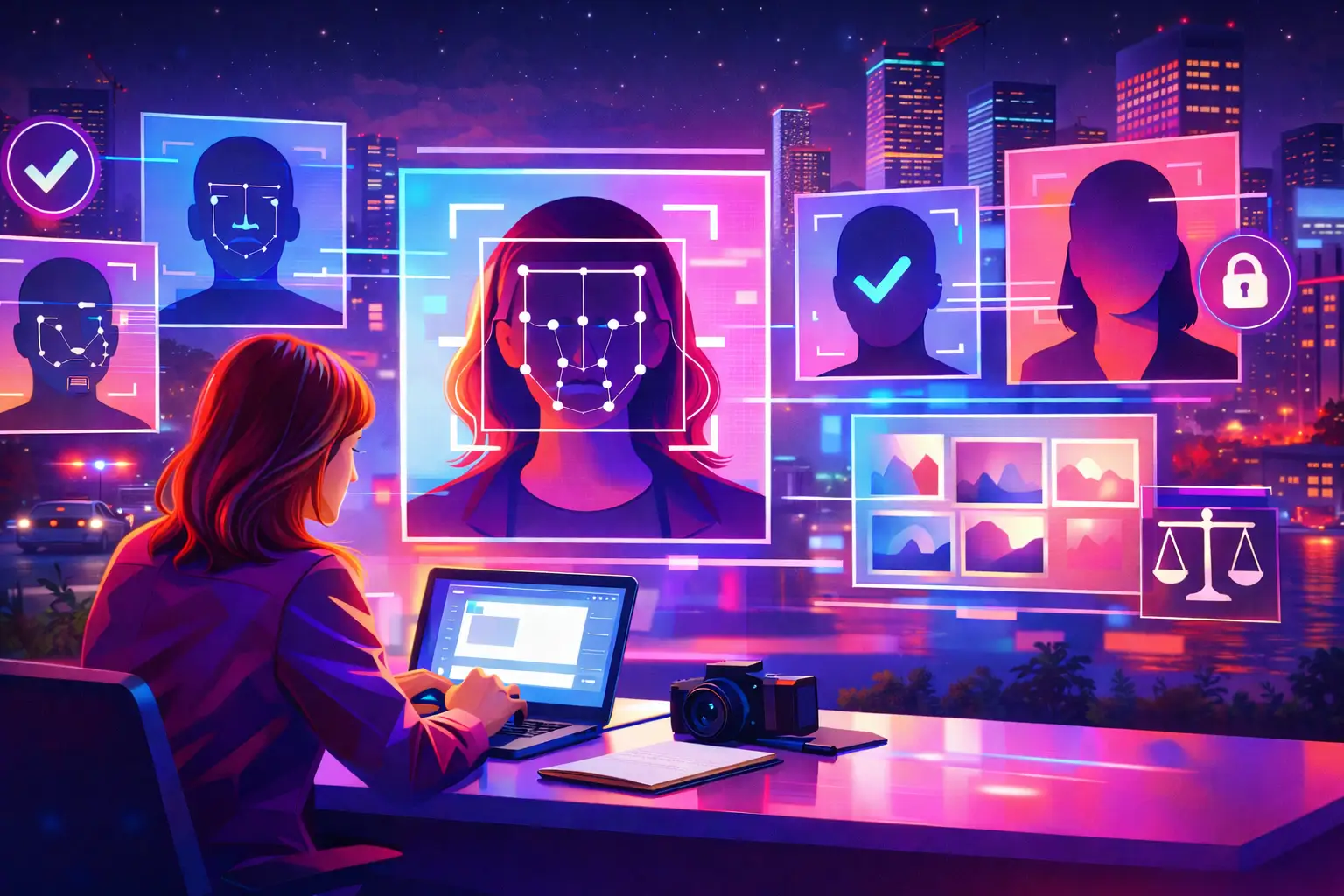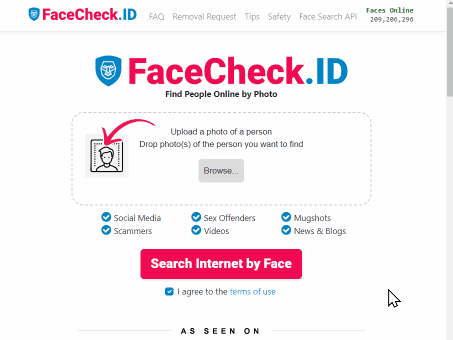New Search-by-Face Tool for Investigative Journalists
Real-world Applications of FaceCheck.ID in Investigative Reporting
In this article, we're going to discuss
- The Evolution of Investigative Journalism
- FaceCheck.ID: A Game Changer
- The Ethical Implications of FaceCheck.ID
- The Future of Investigative Journalism with FaceCheck.ID
- Understanding FaceCheck.ID
- The Technology Behind FaceCheck.ID
- Legal and Ethical Considerations of Using FaceCheck.ID
- Investigative Journalism in the Modern Age
- How FaceCheck.ID Addresses These Challenges
- Case Studies: FaceCheck.ID in Action
- Using the Latest Online Tools for Investigation
- Balancing Power and Responsibility
- Legal Considerations and Potential Risks
- Best Practices for Ethical Use of FaceCheck.ID
- Predicting the Future: FaceCheck.ID and Investigative Journalism
- Potential New Applications and Opportunities
- Shaping the Future of Investigative Journalism
- Recap: The Power and Responsibility of FaceCheck.ID
- Restating the Thesis: The Role of FaceCheck.ID in Investigative Journalism
- Final Thoughts: Embracing the Future of Investigative Journalism
- How to Investigate: Visual Search and Verification
- Lessons in Investigative Journalism
The Evolution of Investigative Journalism
The landscape of investigative journalism has dramatically transformed with the advent of digital technology. Among the array of tools available to journalists today, FaceCheck.ID, a facial recognition search engine, stands out for its potential to significantly enhance investigative work.

FaceCheck.ID: A Game Changer
FaceCheck.ID is not just another tool; it's a paradigm shift. It enables journalists to scan through thousands of images and videos from various sources in seconds, identifying individuals of interest with remarkable efficiency. This capability can be likened to a highly efficient research assistant, tirelessly analyzing vast amounts of visual data to find the crucial details that can make or break a story.
The Ethical Implications of FaceCheck.ID
However, the power of FaceCheck.ID also brings with it a set of challenges and responsibilities. It's crucial to consider not only its capabilities but also the ethical implications of its use. As we explore the world of facial recognition technology and its potential for investigative journalism, we will examine both its benefits and the ethical considerations that this new technology introduces.
The Future of Investigative Journalism with FaceCheck.ID
In this exploration of FaceCheck.ID, we will delve into how this tool can expedite investigations, enhance accuracy, and potentially redefine news gathering in the 21st century.
Understanding FaceCheck.ID
To fully appreciate the potential of FaceCheck.ID, it's important to understand what it is and how it works. At its core, FaceCheck.ID is a facial recognition search engine. It uses advanced algorithms to analyze facial features in images and videos, comparing them to a database of known faces to find matches. This process, known as facial recognition, is powered by machine learning and artificial intelligence technologies.
The Technology Behind FaceCheck.ID
FaceCheck.ID's facial recognition capabilities are built on a foundation of machine learning and artificial intelligence. These technologies enable the system to learn from the data it processes, improving its accuracy over time. This means that the more images and videos FaceCheck.ID analyzes, the better it becomes at recognizing faces.
Legal and Ethical Considerations of Using FaceCheck.ID
While FaceCheck.ID offers significant advantages for investigative journalism, it's important to consider the legal and ethical implications of its use. Facial recognition technology has been the subject of debate due to concerns about privacy and consent. As journalists, it's crucial to balance the public's right to know with the individual's right to privacy.
Investigative Journalism in the Modern Age
Investigative journalism, by its very nature, is a challenging field. It involves digging deep into complex issues, verifying facts, and uncovering hidden truths. In the digital age, these challenges are compounded by the sheer volume of information available. Sifting through this data to find relevant information can be a daunting task.
How FaceCheck.ID Addresses These Challenges
This is where FaceCheck.ID comes into play. By automating the process of identifying individuals in images and videos, FaceCheck.ID can significantly speed up the investigation process. Instead of manually searching through countless images and videos, journalists can use FaceCheck.ID to quickly find the information they need. This not only saves time but also enhances the accuracy and reliability of their reporting.
Case Studies: FaceCheck.ID in Action
To illustrate the potential of FaceCheck.ID, let's look at some examples and use cases. In several high-profile investigative reports, journalists have used FaceCheck.ID to identify individuals involved in illegal activities, from organized crime to political corruption. These case studies highlight the power of FaceCheck.ID as a tool for investigative journalism, demonstrating how it can be used to uncover the truth and hold those in power accountable.
Uncovering Organized Crime Networks: Investigative journalists could use FaceCheck.ID to identify individuals involved in organized crime. By analyzing images and videos from various sources, journalists could identify connections between individuals, helping to uncover the structure and operations of criminal networks.
Exposing Political Corruption: FaceCheck.ID could be used to identify politicians or government officials involved in corrupt activities. For instance, if a journalist has images or videos of a secret meeting, they could use FaceCheck.ID to identify the individuals present and potentially expose corrupt practices.
Tracking Human Trafficking: In cases of human trafficking, FaceCheck.ID could be used to identify victims or perpetrators. By analyzing images and videos from social media, surveillance footage, or other sources, journalists could help law enforcement agencies track down traffickers and rescue victims.
Investigating Protest Movements: Journalists covering protests or civil unrest could use FaceCheck.ID to identify key figures or agitators within the crowd. This could provide valuable context for their reporting and help them understand the dynamics of the protest movement.
Verifying War Crimes: In conflict zones, FaceCheck.ID could be used to verify the identities of individuals involved in war crimes. By comparing images or videos from the conflict zone with known databases of war criminals, journalists could help bring these individuals to justice.
Fact-Checking and Debunking Disinformation: FaceCheck.ID could be used to fact-check images or videos used in disinformation campaigns. By verifying the identities of the individuals involved, journalists could debunk false claims and provide accurate information to the public.
Investigating Environmental Crimes: Journalists could use FaceCheck.ID to identify individuals or corporate representatives involved in environmental crimes such as illegal logging, poaching, or illegal waste dumping. By analyzing images or videos from these activities, journalists could expose those responsible and contribute to their prosecution.
Uncovering Corporate Malfeasance: FaceCheck.ID could be used to identify corporate executives involved in unethical or illegal activities. For instance, if a journalist has images or videos of a secret corporate meeting or illegal activities, they could use FaceCheck.ID to identify the individuals present and potentially expose corporate scandals.
Investigating Hate Crimes: In cases of hate crimes, FaceCheck.ID could be used to identify perpetrators. By analyzing images and videos from social media, surveillance footage, or other sources, journalists could help law enforcement agencies track down those responsible and bring them to justice.
Exposing Child Exploitation Networks: Journalists could use FaceCheck.ID to identify individuals involved in child exploitation networks. By analyzing images and videos from various sources, journalists could identify connections between individuals, helping to uncover the structure and operations of these illegal networks.
Investigating Sports Corruption: FaceCheck.ID could be used to identify athletes, coaches, or officials involved in match-fixing or doping scandals. By comparing images or videos with known databases of individuals involved in sports corruption, journalists could help expose these activities.
Uncovering Espionage Activities: Journalists could use FaceCheck.ID to identify spies or foreign agents operating in their country. By analyzing images and videos from various sources, they could potentially expose covert operations and contribute to national security.
Investigating Cybercrime: In cases where cybercriminals are captured on surveillance footage or in social media images, FaceCheck.ID could be used to identify these individuals, aiding in their capture and prosecution.
Exposing Illegal Wildlife Trade: Journalists could use FaceCheck.ID to identify individuals involved in the illegal wildlife trade. By analyzing images and videos from black market sales, poaching activities, or smuggling routes, journalists could help expose these illicit networks.
Investigating Drug Trafficking: FaceCheck.ID could be used to identify individuals involved in drug trafficking. By analyzing images and videos from drug busts, surveillance footage, or social media, journalists could help law enforcement agencies track down those involved in the drug trade.
Uncovering Fraud and Scams: Journalists could use FaceCheck.ID to identify individuals involved in fraudulent activities or scams. By analyzing images and videos related to these activities, journalists could expose these schemes and help protect the public.
Investigating Terrorism: FaceCheck.ID could be used to identify terrorists or individuals linked to terrorist organizations. By comparing images or videos from crime scenes or propaganda materials with known databases of terrorists, journalists could contribute to national and global security efforts.
Exposing Human Rights Violations: In cases of human rights violations, FaceCheck.ID could be used to identify perpetrators. By analyzing images and videos from incidents of abuse, journalists could help bring these individuals to justice and shed light on these important issues.
Unveiling Lobbying Activities: Journalists could use FaceCheck.ID to identify individuals involved in undisclosed lobbying activities. By analyzing images and videos from private meetings or public events, journalists could expose potential conflicts of interest and contribute to greater transparency in politics.
Investigating Historical Events: FaceCheck.ID could be used to identify individuals in archival footage or photographs, providing new insights into historical events. This could be particularly useful in retrospective investigations or in verifying historical accounts.
Exposing Insider Trading: Journalists could use FaceCheck.ID to identify individuals involved in insider trading. By analyzing images and videos from financial districts, private meetings, or social gatherings, journalists could uncover illicit financial activities.
Investigating Police Misconduct: FaceCheck.ID could be used to identify law enforcement officers involved in misconduct or abuse of power. By analyzing images and videos from incidents, journalists could help hold these individuals accountable.
Investigating Gang Activities: FaceCheck.ID could be used to identify gang members or individuals linked to gang activities. By comparing images or videos from crime scenes or social media with known databases of gang members, journalists could contribute to community safety efforts.
Using the Latest Online Tools for Investigation
Balancing Power and Responsibility
While the benefits of FaceCheck.ID are clear, it's equally important to consider the ethical implications of its use. The power to identify individuals in images and videos can be a double-edged sword. On one hand, it can help journalists uncover the truth and hold those in power accountable. On the other hand, it can potentially infringe on individuals' privacy rights.
Legal Considerations and Potential Risks
In addition to ethical considerations, there are also legal aspects to consider when using FaceCheck.ID. Laws regarding the use of facial recognition technology vary by country and region, and journalists must ensure they are in compliance with these laws. Failure to do so can result in legal repercussions, not to mention damage to the journalist's reputation and credibility.
Best Practices for Ethical Use of FaceCheck.ID
Given these considerations, it's crucial for journalists to use FaceCheck.ID responsibly. This means obtaining necessary permissions, respecting individuals' privacy rights, and using the technology only when it's necessary and in the public interest. By adhering to these best practices, journalists can leverage the power of FaceCheck.ID while upholding the ethical standards of their profession.
Predicting the Future: FaceCheck.ID and Investigative Journalism
As technology continues to evolve, so too will the capabilities of tools like FaceCheck.ID. Future advancements in facial recognition technology could make it even more accurate and efficient, opening up new possibilities for investigative journalism. For instance, real-time facial recognition could allow journalists to identify individuals in live video feeds, providing real-time insights during unfolding events.
Potential New Applications and Opportunities
Beyond improving existing capabilities, future advancements could also lead to entirely new applications for FaceCheck.ID. For example, it could be used to analyze historical footage for retrospective investigations, or to identify patterns and connections between individuals across multiple sources of visual data. These potential applications could further expand the role of FaceCheck.ID in investigative journalism.
Shaping the Future of Investigative Journalism
In conclusion, FaceCheck.ID has the potential to significantly shape the future of investigative journalism. By providing journalists with a powerful tool for identifying individuals in images and videos, it can speed up investigations, enhance accuracy, and open up new possibilities for uncovering the truth. However, it's crucial for journalists to use this tool responsibly, balancing its benefits with the ethical and legal considerations it brings. As we move forward into this new era of investigative journalism, FaceCheck.ID will undoubtedly play a key role in defining its trajectory.
Recap: The Power and Responsibility of FaceCheck.ID
In conclusion, FaceCheck.ID offers a powerful new tool for investigative journalists. Its ability to quickly and accurately identify individuals in images and videos can expedite investigations and enhance the accuracy of reporting. However, this power comes with a responsibility to use the tool ethically and legally, respecting privacy rights and adhering to relevant laws and regulations.
Restating the Thesis: The Role of FaceCheck.ID in Investigative Journalism
The advent of FaceCheck.ID represents a significant shift in the field of investigative journalism. By providing a tool that can quickly sift through vast amounts of visual data, it has the potential to redefine how investigations are conducted. However, as with any powerful tool, it must be used responsibly, with a clear understanding of its ethical and legal implications.
Final Thoughts: Embracing the Future of Investigative Journalism
As we look to the future, it's clear that technology will continue to play a pivotal role in investigative journalism. Tools like FaceCheck.ID, with their ability to harness the power of artificial intelligence and machine learning, will be at the forefront of this evolution. By embracing these tools and learning to use them responsibly, investigative journalists can continue to uncover the truth, hold those in power accountable, and serve the public interest in the digital age.
How to Investigate: Visual Search and Verification
*Alex Thompson, a seasoned investigative journalist, has been chasing stories for over a decade, often literally. Known for his uncanny ability to sniff out a scoop, he's been found in the most unexpected places, from the top of a tree during a political rally to the back of a bakery while uncovering a bread price-fixing scandal. With a knack for turning the mundane into the extraordinary, Alex has a unique way of making even tax evasion seem as thrilling as a blockbuster movie. When he's not wrestling with the truth or arguing with his temperamental coffee machine, Alex enjoys exploring the wilderness, often returning with nothing more than a bizarre tan line and a story about that one time he got lost and discovered a hidden monastery.
*
Lessons in Investigative Journalism
Read More on Search by Face
Image Search for Catfish, 3 Steps to Uncover the Fakes!
Fake profiles are everywhere, and that charming new follower might be using stolen photos. A quick reverse image search can show you if someone's picture pops up elsewhere online under a different name - helping you spot the scam before you invest your time, trust, or money.
On the subject in other languages
Nova ferramenta de busca por rosto para jornalistas investigativos
新的面部搜索工具,为调查记者提供便利
Nový nástroj pro hledání osob podle tváře pro investigativní novináře
Neues Suchen-nach-Gesicht-Tool für Investigative Journalisten
Nueva herramienta de búsqueda por rostro para periodistas de investigación
Nouvel outil de recherche par visage pour les journalistes d'investigation
Nuovo strumento di ricerca tramite volto per giornalisti investigativi
新しい顔検索ツール、調査報道ジャーナリスト向け
새로운 얼굴 검색 도구로 수사 기자들을 돕다
Nowe narzędzie wyszukiwania twarzy dla dziennikarzy śledczych
Новый инструмент поиска по лицу для журналистов-расследователей
أداة البحث الجديدة عن طريق الوجه للصحفيين التحقيقيين
Yeni Yüzle Arama Aracı Araştırmacı Gazeteciler İçin
Popular Topics
Artificial Intelligence Face Recognition Search Engine Face Recognition Search Identity Social Media Facial Recognition How To Facial Recognition Technology LinkedIn Law Enforcement Visual Search Investigative JournalismExpert Analysis: PimEyes vs FaceCheck for Facial Recognition 2026

